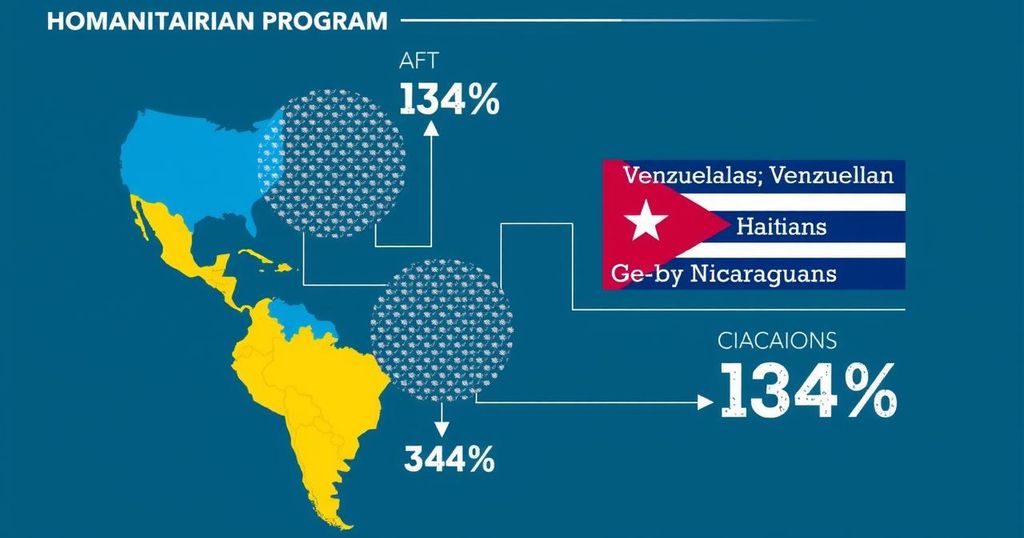Global news
BID, BIDEN ADMINISTRATION, CATHOLIC LEGAL SERVICES, CUBA, DEPARTMENT OF HOMELAND SECURITY, DONALD TRUMP, FED, HAITI, HERALD, INTERNATIONAL RELATIONS, LEGISLATION, MCCLATCHY, MIAMI HERALD, NATIONAL SECURITY, NORTH AMERICA, RANDY MCGRORTY, SANCTIONS, SOUTH AMERICA, U. S, VENEZUELA
Fatima Khan
0 Comments
U.S. Ends Humanitarian Parole Program for Migrants From Crisis-Hit Nations
The U.S. will not renew its humanitarian parole program for Venezuelans, Haitians, Cubans, and Nicaraguans, leading many migrants to face potential deportation after two years unless they secure alternative legal status. Originally aimed at providing a safe pathway for individuals from countries in crisis, the termination of this program raises concerns about increased undocumented migration and the implications for those affected by deteriorating conditions in their home countries.
The U.S. government has announced that it will not renew the humanitarian parole program that has provided temporary residency to numerous Venezuelans, Haitians, Cubans, and Nicaraguans over the past two years. This program had allowed individuals from these nations to enter the United States with authorized status under specific health and background checks. As a result, many will need to leave the country after their two-year stay unless they can find alternative immigration options, such as applying for Temporary Protected Status or asylum. The end of this program has been met with significant concern, particularly given the prevailing crises in the home countries of these migrants. Originally launched for Venezuelans in October 2022, and subsequently extended to include nationals from Cuba, Haiti, and Nicaragua in early 2023, the program aimed to alleviate the humanitarian pressures faced by these populations. However, as the expiration of the initial paroles approaches, many individuals who arrived under this initiative will find themselves without legal status. While some may apply for Temporary Protected Status, others will need to find different legal avenues or prepare to leave the country. The announcement has significant implications, especially for Venezuelan migrants, as conditions in their home nation continue to deteriorate under political oppression. The Biden administration’s decision to terminate the humanitarian parole program comes amidst intense scrutiny and evolving immigration policies. Advocates for affected migrants have expressed their dismay, emphasizing that this decision occurs at a time when many people are actively seeking permanent solutions to their immigration status. As the administration faces challenges from Republican lawmakers opposing the program, concerns have been raised regarding the potential for increased undocumented migration as individuals seek alternative means to enter the U.S. These developments underscore the complicated and often urgent realities faced by those fleeing difficult circumstances in their home countries.
The humanitarian parole program was initiated by the Biden administration to provide temporary refuge for nationals from Venezuela, Haiti, Cuba, and Nicaragua, enabling them to come to the United States legally for two years. This move was part of a broader strategy to manage migration more effectively amidst significant flows of individuals seeking asylum due to extreme conditions in their home nations. With the program’s expiration looming, many migrants now face uncertainty regarding their ability to remain in the U.S., particularly as related immigration policies evolve in a politically charged environment.
In conclusion, the U.S. government’s decision to end the humanitarian parole program for Venezuelan, Haitian, Cuban, and Nicaraguan nationals poses significant challenges for hundreds of thousands of migrants. While some may explore options like Temporary Protected Status, the lack of alternative legal pathways for many will necessitate departure from the country. As the political landscape regarding immigration continues to shift, both the migrants affected and the broader implications for U.S. immigration policy require careful consideration and response from the administration.
Original Source: www.miamiherald.com




Post Comment